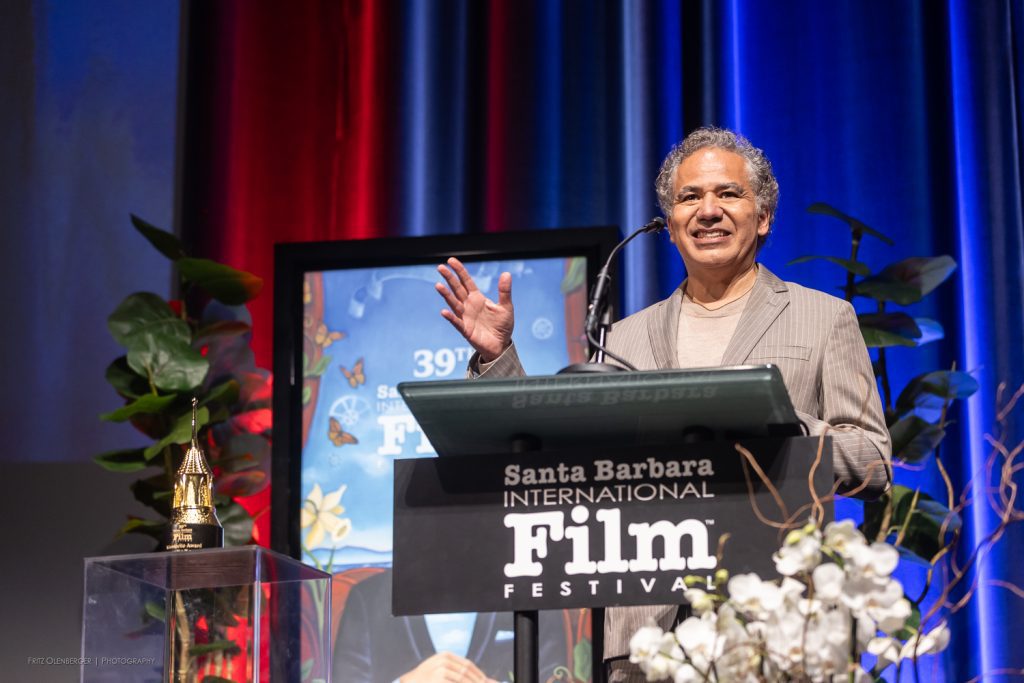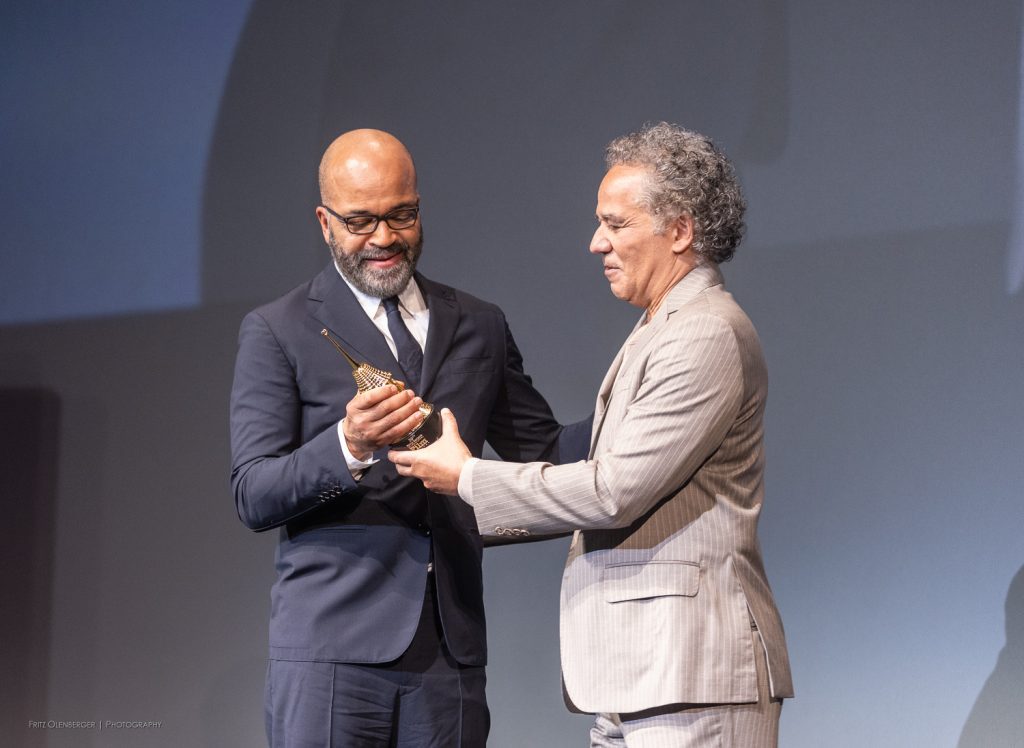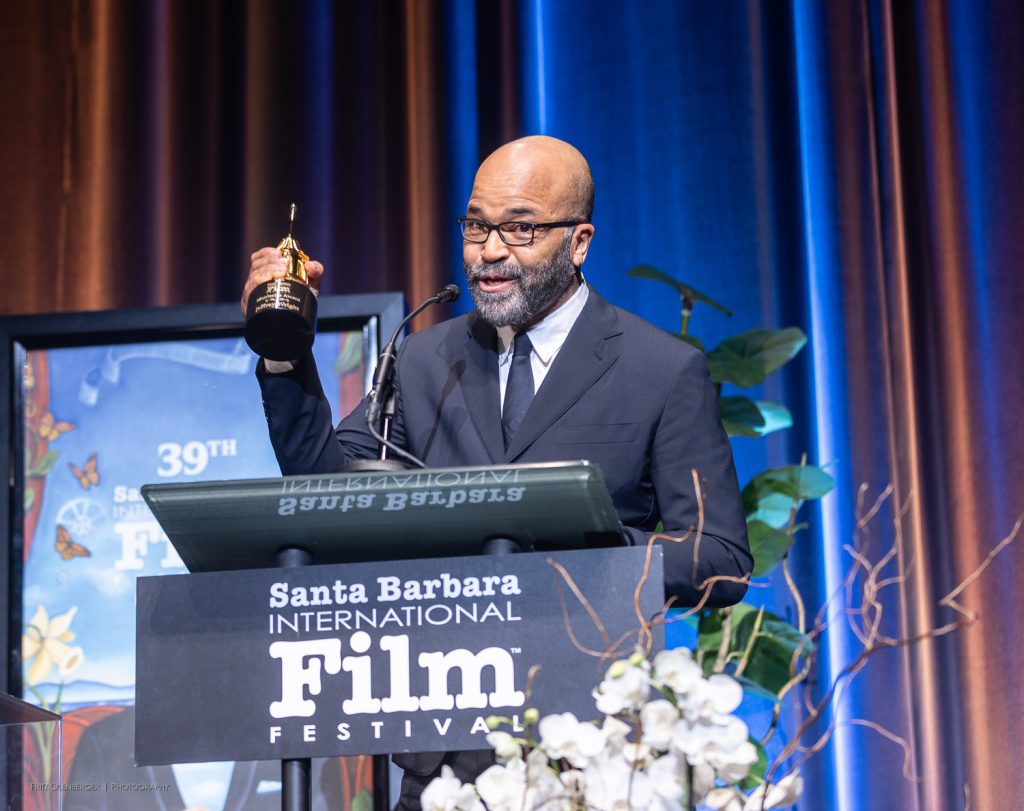The extremely versatile actor Jeffrey Wright was the recipient of the Montecito Award on Thursday night at the Santa Barbara International Film Festival (SBIFF), and what a wonderful storyteller he is. He generously recalled many highlights of his theatrical and film career. The evening was moderated by SBIFF Executive Director Roger Durling, who came well-prepared with questions.
“Jeffrey Wright brings an unparalleled, unassuming commitment to his roles. He exudes such vibrancy and intellect that even the small parts become standouts. He exalts any project by merely being on it,” said Durling.
Wright grew up in Washington, DC, an only child raised by two women (his mother, and his aunt; his father died when he was a child). He noted that being raised by two women “is like being raised by ten men.” He said his mother “laid out pathways” for him, showing him his options in life, and theater was one of these. He recalled going to plays with his mother at the age of 7, and believing that the world of the play continued behind the curtain after the play ended. It was the beginning of the love of theater that has carried through his life.
He began acting in his junior year of college, while studying political science, and attended the Tisch School of the Arts at NYU, but amazingly left after two months to appear in a play. So it began.
“Your first big break is when you get on stage or in front of the camera for the first time and nobody throws something at you, and instead, they lean in,” he said.

After just a few years of theater work he was cast in the epic, multi-award-winning play Angels in America. He played Belize, Roy Cohn’s nurse. Several years later he reprised the role in the HBO TV version, the only original Broadway cast member to do so.
“It spoiled me in some ways, because it was a perfect marriage of my interests. Storytelling and politics. And it was so beautiful, so lyrical. Just a masterful piece of writing. When I say it was a perfect experience, there were times that I was doing that play, I remember saying to myself ‘I am where I am to be right now,’” he said.
In discussing acting in general, Wright said a friend’s adage “If you can’t beat ‘em, confuse ‘em” became his mantra.
One of the first clips we viewed was of his first big film breakout role, as Jean-Michel Basquiat in Basquiat. The director Julian Schnabel recorded a short message to Wright, which was shown after the Basquiat clip, recalling how brilliantly he played the role. Wright recalled that he frequently went to Schnabel’s studio to practice painting and become familiar with the physicality of it.
On playing Basquiat, Wright shared, “I understood spaces that he inhabited. I understood what he was trying to do, in some ways…I also think I draw from similar creative sources or pools. His work speaks so deeply to me.”

In another clip, from Shaft, Wright plays a Dominican drug dealer, and recalled how he perfected the character’s accent. He joined a men’s club in New York where he would hang out while performing in Angels in America, and the manager of the club was Dominican. Wright asked him to read the Shaft script with him and he imitated his accent.
Wright depicted several real-life characters other than Basquiat. He played Muddy Waters in Cadillac Records, and praised the influence on modern music that Waters had. He also played Colin Powell, Martin Luther King, Jr, and Adam Clayton Powell, among others.
One role he discussed at length was as a prison inmate in O.G. He recalled the experience of shooting in an actual penitentiary, and that most of the extras were other prisoners. He spoke of establishing relationships with some of the prisoners, in some cases lifers serving sentences of 100 years or more.
He loved playing Jim Gordon in The Batman, and saw his character’s relationship with Batman as a kind of Sherlock Holmes and Watson dynamic. Because it began shooting right as COVID hit, some scenes were shot in 2020, and then continued in 2021, but clever editing makes it look seamless.

Of the brilliant script for American Fiction, from the Percival Everett novel Erasure adapted by writer-director Cord Jefferson, Wright praised its ability to talk about issues around race and identity, but also look deeply at family relationships. He noted, “We are not smart at talking about race, but we are all thinking about it.” He said the family part of the story had a special poignancy for him as he had lost his own mother shortly before taking on this project.
This wonderful discussion was followed by the award presentation, which was given by his American Fiction co-star John Ortiz, who played his friend and publisher.
“We tell these stories, we make these movies so that people will see them. So that audiences will find them. Take them in and find something inside of them that moves them,” Wright said when accepting the award.
The Santa Barbara International Film Festival is a 501(c)(3) non-profit arts and educational organization dedicated to discovering and showcasing the best in independent and international cinema. Learn more at sbiff.org







